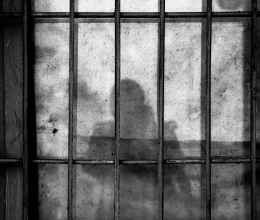The ACLU of Arizona is taking an active role in reforming Arizona’s prison system. To do that in the most effective way, we are working through the Arizona State Legislator to pass reforms to solitary confinement and prisoners’ mental health care.
Solitary confinement, no matter what you call it, is one the harshest and most extreme forms of punishment that can be inflicted on a person. Unfortunately, it is too often used as a disciplinary tool of first resort for non-violent and “difficult” prisoners, including people who have mental illness. This is the case even though psychology experts have determined that the conditions created by solitary confinement are far too severe to serve any kind of penological purpose.
About Solitary Confinement
Solitary confinement—keeping a prisoner in a cell for 22 or more hours per day—is costly, puts correctional officers at risk, and exacerbates prisoner misconduct and psychiatric dysfunction. Arizona should begin gathering data about its use of solitary confinement so that policymakers can review the effectiveness of the state’s isolation practices.
Life in Solitary Confinement
Conditions of solitary confinement are designed to minimize human contact and environmental stimulation. Prisoners are held in 8’ by 10’ cells with a solid steel door and no window to the outside. They have no means of telling time and become disoriented and confused, not knowing the date or whether it is day or night. Cells are illuminated 24 hours a day, making sleep difficult and exacerbating mental deterioration. Usually the only people who interact with prisoners are correctional officers who check on them, medical assistants who dispense pills and psychology assistants who talk to them through the front of their cells.
Furthermore, prisoners in isolation do not receive regular contact with psychiatrists or mental health professionals. Treatment usually involves powerful psychotropic medications and little more.
When in solitary, inmates cannot participate in educational classes, job training, drug treatment, work, or any other rehabilitative programming. This does not facilitate rehabilitation and can exacerbate mental illness. Normal human contact is essential for ensuring successful re-entry into society and reducing recidivism rates.
Impact of Solitary Confinement
Indeed, the Arizona Department of Corrections regularly uses solitary confinement on prisoners who are considered dangerous to himself or others, even if the reason for that danger is the prisoner’s mental illness. There are much better ways to deal with mentally ill inmates who have been labeled “dangerous” than to lock them in a room alone, which only further destabilizes them.
Solitary confinement is not reserved for the most violent offenders and inmates. Many people held in solitary are there because they have mental illnesses or cognitive disabilities, despite the known fact that extended isolation will only make these issues more severe.
Prisoners with mental illness are locked in isolation at much greater rates than prisoners who have no history or diagnosis with mental illness. There is a popular misconception that solitary is used only for the most violent offenders. But in Arizona, 35 percent of prisoners in “supermax” solitary units are there for non-violent offenses, according to the Arizona Republic.
Solitary confinement is particularly dangerous for mentally ill prisoners. Of the 3,000 people held in solitary confinement in Arizona on any given day, about one-third of them are seriously mentally ill. Unlike many states, Arizona doesn’t exclude the mentally ill from solitary. These prisoners suffer from conditions like schizophrenia and it is not uncommon for them to harm themselves as a result of their confinement. Prisoners have been known to cut themselves, bang their heads, starve themselves, preform self-mutilation and commit suicide. In 2012, Arizona’s prison-suicide rate was 60 percent above the national average.
At the same time, solitary confinement only abridges the possibility of full rehabilitation for inmates. Research shows that isolation exacerbates mental illness in prisoners and causes mental illness in prisoners who have not previously had a history of mental illness. This is not an environment conducive for rehabbing people and preparing them for a successful life back in society.
Mental health experts have noted the problems with direct release from isolation to the community and called for prerelease programs to help prisoners held in solitary confinement transition to the community more safely. Wouldn’t a better solution be to keep people out of solitary confinement in the first place and offer them effective rehabilitation services with in prison?
The Toll on Arizona’s Taxpayers and Employees
Arizona residents are also paying for solitary confinement. Many prisoners that are in solitary confinement are there for years at a high cost to taxpayers. According to a 2007 assessment of prison costs, Arizona has to spend about $50,000 per year per prisoner to keep them in solitary compared to $20,000 to keep them in the general population.
Prisoners aren’t the only ones put in danger by this practice. Last year a union of Texas correctional officers called for the elimination for solitary confinement for death row inmates because of the increased and unnecessary danger that isolated inmates present to officers.
Research shows prison violence is related to how prisoners are treated and how prisons have been managed and staffed. A 2006 study found that opening a supermax prison had no effect on prisoner-on-prisoner violence in Arizona, Illinois and Minnesota. The same study found prisoner-on-staff violence actually increased in Arizona. A similar study in California found that isolation increased violence in the prison system.
What the ACLU is working towards
State prison officials admit they keep no mental health records of prisoners in isolation. We need them to begin maintaining these records so that Arizona can begin to develop better and more cost-effective, evidence-based prison practices that will make prisons safer and rehabilitate prisoners for their return to the community.
Correcting this glaring lapse in oversight is a major step to properly reforming Arizona’s grossly negligent prison system.
Studying solitary confinement can be a benefit to all. Having a better understanding of solitary confinement can help reduce overall prison costs and keep corrections officers and prisoners safe. In Mississippi, they were able to reduce their solitary confinement population by 90 percent, saw incidence of violence plummet and saved millions of dollars in the process by finding alternatives to solitary confinement.
Perhaps most importantly, studying solitary confinement can help Arizona restore the purpose of punishment-rehabilitation. Arizona’s limited public money should be invested in programs that lead to successful re-entry and solitary confinement has proven to be a losing public investment.
The ACLU of Arizona is advocating for legislation that would require the Arizona Department of Corrections (ADOC) to submit to the Governor, President of the Senate and Speaker of the House of Representatives a quarterly report on the use of solitary confinement, included with that report an assessment of its policy practices and use on inmates with mental health conditions.
Each quarterly report would also include each of the following:
- The number of prisoners held in solitary confinement
- The details of each prisoner (without their names) including their mental health status, approximate age, race, their length of stay in solitary, their amount of out-of-cell time, and their reason for being in isolation
- List the number of incidents of self-harm by inmates and use of force against inmates that occurred during their time in solitary
- Steps to reduce the solitary confinement population
The ACLU of Arizona has been successful in defending prisoners’ rights and holding ADOC accountable for inhumane and dangerous prison conditions. In the recent settlement in our case Parsons v. Ryan, ADOC agreed to step-up their care for inmates where it was lacking and start caring where it was absent.
However, that settlement focused primarily on those with documented mental illness and not everyone that is held in solitary confinement. The ACLU’s proposed legislative goals are much more robust and add a layer of transparency and accountability that no court can consistently monitor alone. And, since remedies through the court system are easily more amendable than official legislation, passing a law through the legislature gives the best chance for long-lasting and effective fixes, if not permanent, to the Arizona Department of Corrections.
For more information, contact ACLU of Arizona Executive Director Alessandra Soler at
(602) 650-1854 or asoler@acluaz.org.

